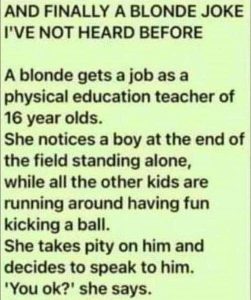This was Ms. Harper’s first week as a teacher of physical education. She was a young woman with golden hair and a big smile who was enthusiastic and wanted to make a good impression. The sun was high in the sky, the kids were playing soccer on the vast green field, and the air smelled like fresh grass.
She gazed at the group of 16-year-olds, but one boy stood out. He was near the end of the field, not saying anything, with his hands in his pockets and his eyes on the ground. He stood still, like a shadow that had been forgotten, while the others roared and laughed.
Something inside Ms. Harper told her to do something. The grass made a nice crunching sound as she went over it. “Hey,” she said softly, “Are you okay out here?”
The youngster looked up after a while. “Yes,” he responded in a low voice. “I just don’t feel like I belong here.” I’m not particularly good in sports, just like everyone else.

He didn’t seem angry; he just sounded like he had lost. Ms. Harper smiled in a kind way. She said, “You know, not everyone shines when they kick a ball.” Sometimes, the top players can see the game before it starts and get ready for it.
He liked her and wasn’t sure if she was kidding. He asked, “Do you mean a plan?”
“Yes,” she said. “What about this? You help me get ready for the next class challenge tomorrow. You need to work together and establish plans, not just be swift or strong.
The boy’s eyes got big, and then he gently grinned. “Okay,” he said in a hushed voice. “I’ll give it a try.”
That night after school, they all got together to come up with ideas for a challenge that would test both their minds and bodies. He came to life as he spoke, showing off riddles, obstacle courses, and decisions that had to be taken in a given amount of time. Ms. Harper listened carefully and allowed him take the lead with his thoughts. This time, no one was telling him to run faster or jump higher. They told him to think about what he was doing.
The next day, the students came back to play soccer. Ms. Harper didn’t do that. “This challenge is about brains and teamwork, not just muscles,” she remarked.
The students weren’t sure what to think of her at first, but as she went over the rules, they became more interested. Each team had to take a lesson that comprised short problem-solving stations, tasks that made them work together, and strategic points. “Today, we’ll pick your team leaders,” Ms. Harper said with a smile. It was a tremendous shock that they were chosen. Let’s start with Daniel.
The boy who was calm ceased moving. He said in a quiet voice, “Me?”
“Yes,” Ms. Harper said with confidence. “I think you have what it takes.”
Daniel’s nerves changed into focus when the whistle blew. He led his people carefully and correctly, giving them responsibilities and lifting their spirits when they had troubles. It wasn’t the loudest voice, but it was really strong. He quickly modified the strategy when things got too hard. He told his workers to take a big breath when they were upset.
Daniel’s team finished the task, but they weren’t the first to do it. They did a great job. They were the only ones who could work together like that. The kids cheered, clapped him on the back, and sang his name.
This wasn’t the first time Daniel had hidden. People didn’t see him for what he didn’t have; they saw him for what he did have.
He walked up to Ms. Harper after class, and his face lit up with happiness. He said “thank you” in a low voice. “Because you believe in me.”
She smiled. “You’ve always been able to do it,” she remarked. “You just needed a chance to show it.”
Daniel not only won a fight that day, but he also learned where he fit in in the world. He learned that being the strongest or fastest doesn’t mean you can lead well. You can get it by being sure of yourself, thinking things out, and having the guts to step into the light.
